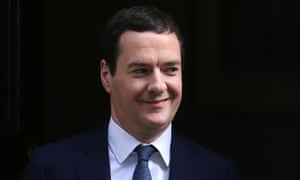
George Osborne was disrespectful of MPs’ rules and set an “unhelpful example” by accepting the post of editor of the London Evening Standard without first clearing it with the government’s independent appointments ethics watchdog, a report has said.
In findings highly critical of the former chancellor, the Commons public administration and constitutional affairs committee said Osborne should have waited for the advice of the advisory committee on business appointments (Acoba), which assesses the appointments of former ministers and senior civil servants.
Acoba was “toothless”, the committee of MPs found, and similar abuses of the system were likely to occur in future.
Osborne initially said he would not stand down as MP for his north-west constituency of Tatton while editing the London paper, saying he would attend editorial meetings in the morning and votes in parliament in the afternoon.
However, Osborne has now said he will not stand for parliament again in the 8 June election. Almost 200,000 people had signed a petition started by one of his constituents urging him to “pick a job”.
The committee said the MP’s decision to announce his appointment before receiving advice “demonstrates disrespect for Acoba and for the business appointment rules and sets an unhelpful example to others in public life who may be tempted to do the same”. Osborne did not give evidence to the committee, though he was invited to do so.
The former chancellor has been rebuked previously by Acoba for failing to wait for its advice before announcing his “northern powerhouse” project, and similar criticism is likely to be levelled in this case.
The watchdog, which has members from the three main UK parties as well as external advisers, has no powers to prevent an ex-minister taking up a role and relies on giving guidance that might embarrass a former minister or senior civil servant were they to take up the role against its advice.
The MPs’ committee said there was a need for a significant overhaul of the ethics watchdog, citing other cases of potential conflict of interest including the former energy secretary Ed Davey and Osborne’s former adviser Rupert Harrison.
Davey, a Lib Dem cabinet minister in the coalition government who is standing for re-election in Kingston and Surbiton in June, was an adviser to the lobbying firm which acted for the French energy giant, EDF, in its successful bid to build the Hinkley Point C power station.
“The failures of governments in this regard have damaged public trust in politics and public institutions and led to repeated scandals,” it said. “Acoba in its current form is a toothless regulator which has failed to change the environment around business appointments.”
In addition to his roles as an MP and editor, Osborne was appointed a part-time adviser to the asset management giant BlackRock, where Harrison is now a portfolio manager. The MP is set to earn £650,000 a year working one day a week advising the firm.
The committee noted that Osborne’s 2014 budget announcement allowing savers to cash in their pension pots had been welcomed by BlackRock’s president, Robert Kapito, who said it was £19.5bn a year of “money in motion”.
After the election was announced, Osborne hinted to the Standard that he may wish to return to politics in future. “I am stepping down from the House of Commons – for now. But I will remain active in the debate about our country’s future and on the issues I care about, like the success of the northern powerhouse,” he said.
Osborne will take up his editorship in mid-May. “At the age of 45, I don’t want to spend the rest of my life just being an ex-chancellor,” he said. “I want new challenges. I’m very excited about the opportunity to edit the Evening Standard. I’ve met the team there, and their energy and commitment to this great newspaper are positively infectious.”